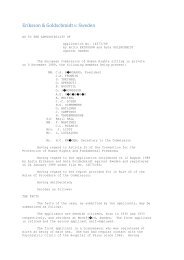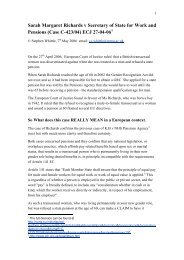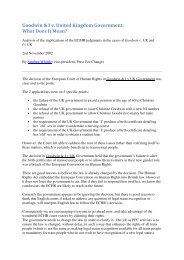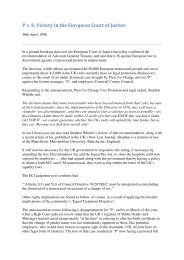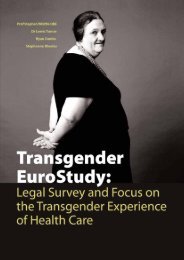R (on the application of Rogers) v Swindon NHS Primary Care Trust ...
R (on the application of Rogers) v Swindon NHS Primary Care Trust ...
R (on the application of Rogers) v Swindon NHS Primary Care Trust ...
Create successful ePaper yourself
Turn your PDF publications into a flip-book with our unique Google optimized e-Paper software.
had to pay for <strong>the</strong> drug she did not have to pay for <strong>the</strong> medical input because DrCole waived his fees.5. Herceptin is given by a loading dose followed by a fur<strong>the</strong>r 17 doses given atthree week intervals. The estimated cost (including VAT) <strong>of</strong> <strong>the</strong> course <strong>of</strong>treatment was £ 26,328.22, which <strong>the</strong> appellant was unable to pay. Sheborrowed £ 5,000 from which she paid for her first two treatments each <strong>of</strong> whichcost £ 1,950. She could not afford to pay for a third treatment. She had originallyhoped to re-mortgage her house to pay for <strong>the</strong> course <strong>of</strong> treatment but, given herdiagnosis, she was unable to do so.6. It was against this background that <strong>the</strong> appellant sought legal advice. Hersolicitors sent a letter before claim <strong>on</strong> 22 November 2005. The resp<strong>on</strong>se, <strong>the</strong>same day, was that, although Herceptin is not prescribed by <strong>the</strong> <strong>NHS</strong> in <strong>the</strong>Swind<strong>on</strong> area, <strong>the</strong> PCT would review each individual case. Dr Cole duly applied to<strong>the</strong> Defendant PCT for funding for <strong>the</strong> appellant's Herceptin treatment but herapplicati<strong>on</strong> was rejected. It is that rejecti<strong>on</strong> which led to <strong>the</strong> applicati<strong>on</strong> forjudicial review. We will return to <strong>the</strong> reas<strong>on</strong>s for <strong>the</strong> rejecti<strong>on</strong> below.7. The applicati<strong>on</strong> for judicial review was issued <strong>on</strong> 12 December 2005.Permissi<strong>on</strong> was granted <strong>on</strong> 21 December by Charles J, who also ordered <strong>the</strong> PCTto fund and provide Herceptin for <strong>the</strong> appellant from <strong>the</strong> date <strong>of</strong> her nextproposed treatment <strong>on</strong> 5 January 2006 until <strong>the</strong> determinati<strong>on</strong> <strong>of</strong> <strong>the</strong> applicati<strong>on</strong>or fur<strong>the</strong>r order. In his order <strong>of</strong> 15 February Bean J ordered that <strong>the</strong> interim orderfor treatment and funding c<strong>on</strong>tinue until <strong>the</strong> end <strong>of</strong> March 2006. The judgequoted this sentence from <strong>the</strong> appellant's witness statement:"It is <strong>on</strong>ly now with <strong>the</strong> Herceptin that I feel that I have been given a small part<strong>of</strong> my life back and I have been able to start thinking about <strong>the</strong> future."At <strong>the</strong> c<strong>on</strong>clusi<strong>on</strong> <strong>of</strong> <strong>the</strong> oral argument we directed that <strong>the</strong> interim order c<strong>on</strong>tinueuntil judgment is given in this appeal.III. Breast cancer and Herceptin8. Again, we take this account from <strong>the</strong> judgment. Breast cancer is <strong>the</strong> mostcomm<strong>on</strong> form <strong>of</strong> cancer in women and is <strong>the</strong> greatest cause <strong>of</strong> death in <strong>the</strong> UK forwomen aged under 65. Traditi<strong>on</strong>al forms <strong>of</strong> treatment for breast cancer havebeen mastectomy, chemo<strong>the</strong>rapy and radio<strong>the</strong>rapy. There has been c<strong>on</strong>siderableresearch into treatments for this cancer, <strong>the</strong> causes <strong>of</strong> which remain unclear.9. Breast cancer can occur in a number <strong>of</strong> forms, including 'HER2-positive' breastcancer. HER2 is a protein found <strong>on</strong> <strong>the</strong> surface <strong>of</strong> certain cancer cells. It is madeby a specific gene called <strong>the</strong> HER2/neu gene. HER2 is a receptor for a particulargrowth factor called human epidermal growth factor, which occurs naturally in <strong>the</strong>body. When human epidermal growth factor attaches itself to HER2 receptors <strong>on</strong>breast cancer cells, it can stimulate <strong>the</strong> cells to divide and grow. Some breastcancer cells have far more HER2 receptors than o<strong>the</strong>rs. In this case, <strong>the</strong> tumouris described as being HER2-positive. It is thought that about <strong>on</strong>e in five womenwith breast cancer will have HER2-positive tumours.10. Tumours that are HER2-positive tend to grow more quickly than o<strong>the</strong>r types<strong>of</strong> breast cancer. A drug called trastuzumab has been developed to be effectiveagainst HER2-positive breast cancer. It is a type <strong>of</strong> m<strong>on</strong>ocl<strong>on</strong>al antibody.M<strong>on</strong>ocl<strong>on</strong>al antibodies are treatments that can target particular proteins within<strong>the</strong> body. An HER2 test can assess whe<strong>the</strong>r a particular cancer has a specificreceptor <strong>on</strong> <strong>the</strong> surface <strong>of</strong> <strong>the</strong> cancer cells. Trastuzumab attaches itself to <strong>the</strong>



